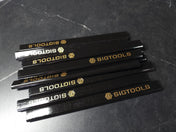Many say,
"Expensive tools are a waste of money. I have the same thing that gets the job done at a fraction of the price."
Yes, they’re right—if the only goal is to complete the task, if they only use the tool occasionally, or if they've never had the chance to try something better.
But what if your tools are your daily companions? What if you rely on them every single day, pushing them to their limits? In these cases, budget tools often don't hold up. They wear out quicker, reduce work efficiency, and worst of all—they might hurt you. Imagine ending up with carpenter's elbow (aka tennis elbow) just because you stuck with cheaper tools.
In this post, let’s dive into the difference between titanium and steel hammers. Sure, we sell titanium hammers—but more importantly, this is about safety and awareness. At the end of the day, it’s your body, and only you can make the right choices to protect it for the long haul.
Steel vs Titanium Hammers
Traditional steel hammers are heavier, which slows down your swing and forces you to use more energy on each strike. That extra weight might seem like a small inconvenience at first, but over time, the fatigue builds up. You’ll feel it in your shoulders, elbows, and wrists—especially after long days on site.

Photo by DevVrat Jadon on Unsplash
On the flip side, titanium hammers are much lighter. They allow you to swing faster, with less effort, which means you’ll get the job done quicker. You won’t tire as quickly, so your energy lasts throughout the day.
But the biggest kicker? Titanium hammers transfer 97% of the swing’s energy into the nail, compared to steel hammers, which only transfer about 70%. That means titanium tools help you work more efficiently, needing fewer swings for the same outcome. Less effort, fewer swings—more results.
Work-related Musculoskeletal Disorders (WMSD)
Work-related Musculoskeletal Disorders (WMSDs) are no joke. They’re common among tradespeople—carpenters, general contractors, and anyone who uses tools daily.
Repeated use of heavy or poorly designed tools contributes to these disorders. Over time, the vibration and impact travel through your hands and arms, causing strain on your muscles, joints, and tendons.
Switching to tools like titanium hammers that transmit less vibration and require less force is one of the smartest ways to protect yourself from WMSDs. Taking care of your body now means fewer health problems later—and more years of doing what you love.

Why Invest in High-Quality Tools?
As a tradesperson, your tools say a lot about you. A high-quality setup not only improves your efficiency—it leaves a lasting impression. When you show up on site with professional-grade tools, people know you’re serious about your craft. It might even open doors to better projects or jobs where you can build your skills.
And here’s the best part: quality tools usually last a lifetime. Think of them like an investment that keeps paying off. With proper care, they can even be passed down to your kids or apprentices someday. How cool is that?
Sure, they’re expensive—just like owning a V8 for its power and growl. But with tools, you pay once, and they immediately improve every aspect of your work—both your performance and your long-term health.
Think about where you want to be in the long run. Whether you’re just starting out or you’ve been in the trade for years, high-quality tools will always help you get there faster, safer, and with less stress on your body.
So, next time you’re choosing between budget tools and a titanium hammer, ask yourself: How much is your health and efficiency worth?
Invest in the best. You’ll thank yourself later.
Signature Tools
Eric




